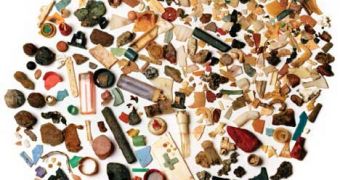We live in a world of plastic. All we eat or drink touches plastic. We handle plastics all the time. Our clothes can be made of plastic. But the plastic era comes with its toll on our health.
Bisphenols, common in plastics, from sunglasses, dental fillings and CDs to water and food containers and shockproof baby bottles have long-term severe impacts on a woman's body, causing sterility.
Phthalates are used in plastics to turn them flexible. Over 75% of the US population presents detectable levels of several phthalates in urine and they have been already connected to reproductive problems, abdominal obesity and insulin resistance in adult men.
Now, a new research published in BMC Genomics completes the list with a new plastic component: butyl benzyl phthalate (BBP), commonly employed to soften plastics and polymers found from plastic pipes and houses to vinyl floor tiles, carpets and lipstick can boost breast development and induce developmental changes in newborn female lab rats, rendering the animals predisposed to breast cancer later in life. Like bisphenols, BBPs imitate the effect of estrogen, the female sex hormone. This type of chemicals called endocrine disruptors cause severe breeding issues in wildlife and also neurological and sterility issues in humans (including in men who present low sperm counts).
"Our study is the first one demonstrating that exposure to this compound (BBP) soon after birth results in alterations in the expression of genes present in the mammary gland", said lead researcher Dr. Jose Russo, a breast cancer expert at the Fox Chase Cancer Center, in Philadelphia.
"The findings are important because the researchers are studying the lifetime effect of BBP on the mammary gland, long before it starts developing under the influence of the hormones of puberty, and the potential implications on humans. Because of lasting genetic changes in the breast, exposure to BBP could increase the risk for developing breast cancer later in life. To prevent breast cancer in adulthood, it is necessary to protect both the newborn child and the mother from exposure to this compound that has an estrogenic effect and could act as an endocrine disruptor", said Russo.
The research team gave lactating rats BBP, which passed to offspring through breast milk. The amounts received by the rat offspring matched the safe limit levels for humans established by the U.S. Environmental Protection Agency. BBP boosted in female offspring breast development and changed genetic activity patterns in the mammary glands.
"While these effects wore off after exposure to BBP was stopped, the changes caused by the chemical might have an effect later in life", wrote the researchers.
"Our original observations are that the genomic changes induced by BBP occur very early in life, and they could result in significant modifications in the risk of the mammary gland to develop cancer later on in life", Russo said.
The team is now testing how these individuals react to carcinogen (cancer-provoking) chemicals given to adult rats.
"We are also studying the effects of exposure to BBP before birth. In addition, we are following a cohort of girls entering puberty for determining the tempo of breast development and their first menstrual period and associating these events with exposure to environmental agents such as BBP", Russo said.
California has already banned any trace of BBP in toys and any product destined to infants.

 14 DAY TRIAL //
14 DAY TRIAL //